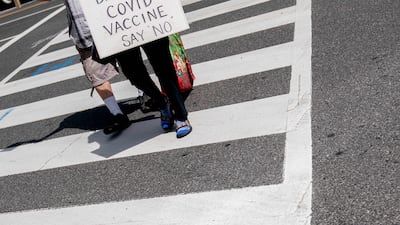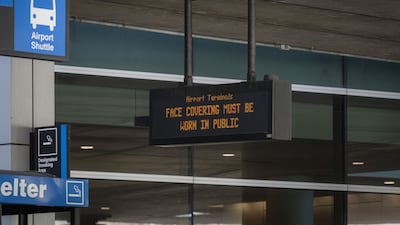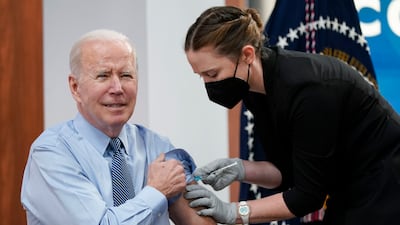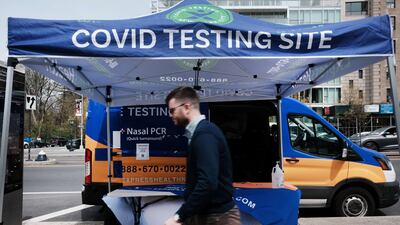Another Covid-19 vaccine is likely to be approved for use in the US after an expert committee voted in its favour.
The advisory committee of the US Food and Drug Administration decided that the benefits of the two-dose Novavax inoculation outweighed its risks.
While the vote – 21 in favour with one abstention – does not mean the shot has emergency use authorisation, it is likely to follow.
Development of the vaccine received $1.8 billion of American government funds, but it has yet to receive approval in the US, despite already having been administered in at least 41 other countries, reports say.
During a public online meeting on Tuesday of the FDA’s vaccines and related biological products advisory committee, members and external speakers offered a range of views.
One argument given in favour of the shot was that it used more established technology than the frequently used mRNA and viral vector Covid-19 vaccines, the nature of which may have put some people off being vaccinated.
The Novavax vaccine, which could be used as a booster shot for vaccinated people, may therefore find a market among the tens of millions of adults in the US who have declined an injection.
Only about 76.7 per cent of adults in the US eligible to receive a Covid-19 dose have been fully vaccinated with two doses.
The Moderna and Pfizer-BioNTech shots are fully approved in the US. A shot made by Johnson & Johnson's Janssen pharmaceutical company has received emergency use authorisation.
Dr Peter Marks, director of the Centre for Biologics Evaluation and Research at the FDA, said there was still a need for more vaccines.
“Although we have mRNA vaccines — we have the Janssen vaccine out there — the Janssen vaccine is not currently used as a frontline vaccine, which leaves the issue of vaccine for those who may not want to take an mRNA vaccine as needing potentially an alternative,” he said.
“Having a protein-based alternative may be more comfortable for some in terms of the acceptance of the vaccine. We do have a problem of vaccine uptake that’s very serious in the US.
“Anything we can do to encourage people to take these potentially live-saving medical products is something we feel compelled to do.”

Concerns were raised of insufficient data about efficacy and risk of serious side-effects, and Novavax conceded that it lacked data on how well the vaccine worked against the Omicron variant.
Among the advantages Novavax highlighted was that its vaccine could be stored at refrigerator temperatures, making it easy to distribute and administer.
The vaccine is made up of coronavirus proteins and an additional substance, an adjuvant, that causes the immune system to react more strongly.
This immune response to the proteins offers protection for people infected with the coronavirus.
The Pfizer-BioNTech and Moderna shots are, by contrast, based on a type of genetic material, mRNA, that causes the cells of recipients to produce virus proteins.
Another type, which forms the basis of the Oxford-AstraZeneca and Janssen vaccines, also makes human cells produce virus proteins, but does this by using viral vectors to deliver the genetic instructions for the proteins into the cells.
Some other Covid-19 vaccines have been associated with a small increased risk of myocarditis, an inflammation of the heart muscle, and pericarditis, an inflammation of the tissue that surrounds the heart, particularly in adolescent males.
Clinical studies have looked at whether this is a concern with the Novavax shot.
Novavax described myocarditis as “an important potential risk” but said more data would be needed to understand whether the vaccine could cause this condition in rare instances.
It said that overall the vaccine had “a positive safety profile”.
The FDA presented data indicating that among 40,000 recipients of the Novavax jab, six reported myocarditis or pericarditis, most within 20 days of being inoculated.
It listed myocarditis and pericarditis as among the “known and potential risks” of the vaccine, alongside Guillain-Barré syndrome, a rare condition affecting the nerves.
Dr Raburn Mallory, senior vice president and head of clinical development at Novavax, said the vaccine “induced high levels of neutralising antibodies in both younger and older adults”.
“Our vaccine is highly efficacious at preventing Covid-19 in a large Phase 3 study," Dr Mallory said. "This efficacy was demonstrated against all the variants that circulated during the study.
“The vaccine also provided complete protection from moderate or severe Covid-19 in our clinical study.
"Our vaccine also demonstrated consistently high efficacy across subgroups, including race, gender and individuals with co-morbidities.”
















